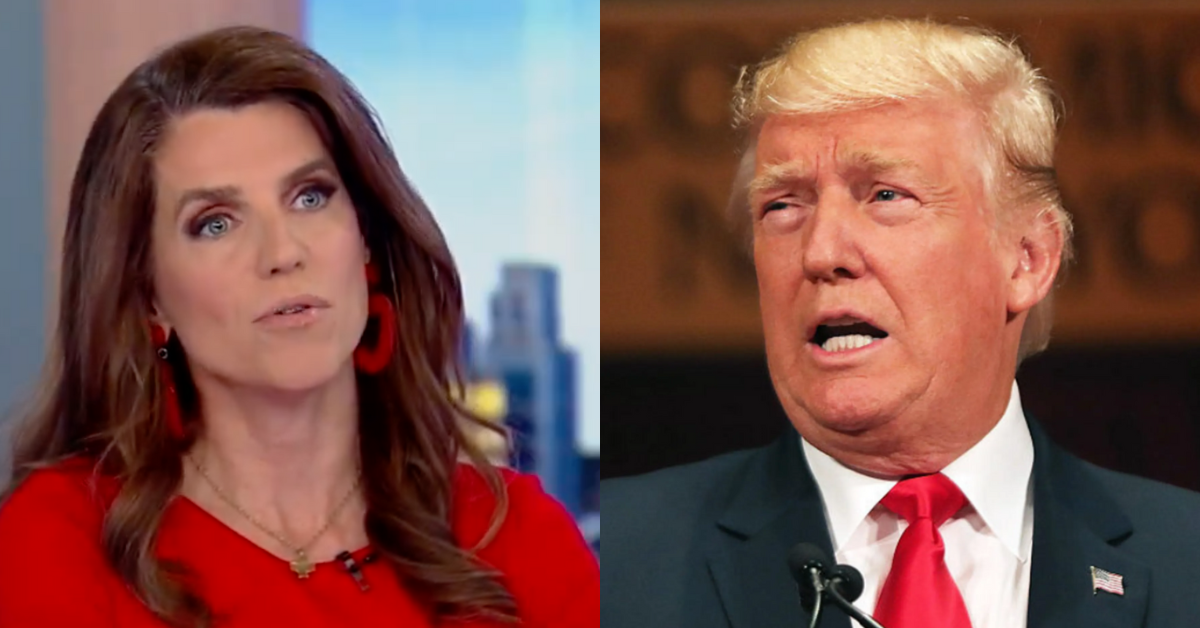nancy mace
Top stories
GOP Rep. Brutally Fact-Checked After Claiming 'Everything Was Better Under Trump'
Nancy Mace got instantly fact-checked by X users after claiming that 'everything was better under Trump.'
South Carolina Republican Representative Nancy Mace was criticized after she claimed that "everything was better under" former President Donald Trump, who faces 91 state and federal criminal charges, most notably for his efforts to overturn the results of the 2020 general election.
Mace, who just endorsed Trump after his victory at the GOP Iowa caucuses, told Fox News that the United States "had a better economy" under Trump, adding:
"Everything was better under Trump by every measurement, every barometer and that is what I hear day in and day out from the voters in South Carolina."
You can hear what she said in the video below.
Trump stands as the sole modern president who concluded his term with a decrease in U.S. jobs compared to the start of his presidency.
The global COVID-19 pandemic, which Trump, unsuccessful in his re-election bid against President Joe Biden, belatedly acknowledged and frequently downplayed or denied during its progression, wreaked havoc on the U.S. economy in his final year in office. The robust job market he anticipated to secure him a second term was obliterated.
In January 2021, just before the conclusion of Trump's term, the Labor Department disclosed that total U.S. employment had plummeted by 140,000 in December, resulting in a total of 142.6 million jobs—approximately 10 million fewer than pre-pandemic levels.
Notably, Trump was recently criticized following an interview with Lou Dobbs on Lindell TV, in which he attacked Biden's handling of the economy and expressed a desire for an economic "crash" in the next year before potentially reentering the White House.
Trump's macabre hopes for the stock market had earlier triggered a strong response from Speaker Emerita Nancy Pelosi, who condemned his comments as "insensitive and grotesque" during a conversation with Jen Psaki on MSNBC.
Contrary to bleak predictions, the December jobs report exceeded expectations, marking a strong year in the labor market. This consistent performance has bolstered consumer spending and overall economic growth.
The clip of Mace's remark quickly went viral on X, formerly Twitter, and prompted many to fact-check her claims about economic performance and to note how Trump's antics worsened the COVID-19 pandemic.
Mace's remarks also obfuscate the reality of the number of groups Trump attacked on a regular basis during his time in office.
From the moment he took office, Trump made clear there were in-groups—comprised of his followers, many of whom were aligned with growing White nationalist and Christian nationalist movements—and out-groups, largely comprised of people who did not vote for him or who were perceived as a threat to his narrow vision of United States supremacy.
Some of the groups Trump attacked during his presidency include but are not limited to:
- Those from Muslim-majority countries, who were subjected to a travel ban within days of his taking office;
- Those who took to the streets to condemn racism and police brutality following the murder of George Floyd, who he suggested should be shot "when the looting starts," breathing life into stereotypes about people of color being more inclined toward criminality;
- Those from Haiti and African nations, who he suggested should not be allowed to immigrate to the United States because they come from "sh*thole countries";
- Indigenous groups who found themselves in a protracted battle for their tribal and ancestral lands after Trump gave fossil fuel companies even more freedom to drill for oil and natural gas;
- Journalists and other members of the free press who were constantly referred to as "enemies of the people";
- The entire United States intelligence community, particularly in regard to the investigation into Russian interference in the 2016 general election;
- Members of the LGBTQ+ community, who criticized the Trump administration for drawing up anti-LGBTQ+ policy and for courting the support of evangelist groups hellbent on overturning Supreme Court rulings that ushered in an era of marriage equality and overturned sodomy laws;
- Migrants, predominantly those crossing the nation's southern border who Trump referred to as "rapists" and who were targeted by the Trump administration's "zero tolerance" family separation policy that was widely condemned by human rights groups;
- Immigrants at large, who were undeniably made to feel unwelcome as a result of immigration architect and senior adviser Stephen Miller's draconian policies;
- Chinese people and those from other East Asian countries, who became more likely to be the victims of hate crimes after Trump employed racist rhetoric to blame China for the spread of COVID-19, which the Trump administration willfully ignored on the belief that the pandemic would largely impact only blue states;
- Women, who bore the brunt of misogynistic pejoratives and more blatant attacks well before Trump referred to former Secretary of State Hillary Clinton as a "nasty woman" on the campaign trail;
- Sexual assault survivors, whom Trump often sought to discredit, even using the Department of Justice (DOJ) to impugn his own accusers and having the Department of Education (DOE) revise rules designed to address an epidemic of sexual violence on college campuses.
Despite all of this and more, Mace endorsed Trump anyway—after saying she'd previously held him "accountable" for the January 6 attack on the Capitol. Mace's endorsement comes just a day before the New Hampshire primary, where Trump leads in the polls over his sole remaining opponent, former South Carolina Governor Nikki Haley.
Her current stance sharply contrasts with her previous comments in the aftermath of the January 6 insurrection. On January 7, 2021, Mace stated that Trump's entire legacy was wiped out, and the country needed to "start over." Despite voting to acquit Trump on January 13, she maintained her position of holding him accountable for the events of January 6.
 SECONDNEXUS
SECONDNEXUS percolately
percolately georgetakei
georgetakei comicsands
comicsands George's Reads
George's Reads





